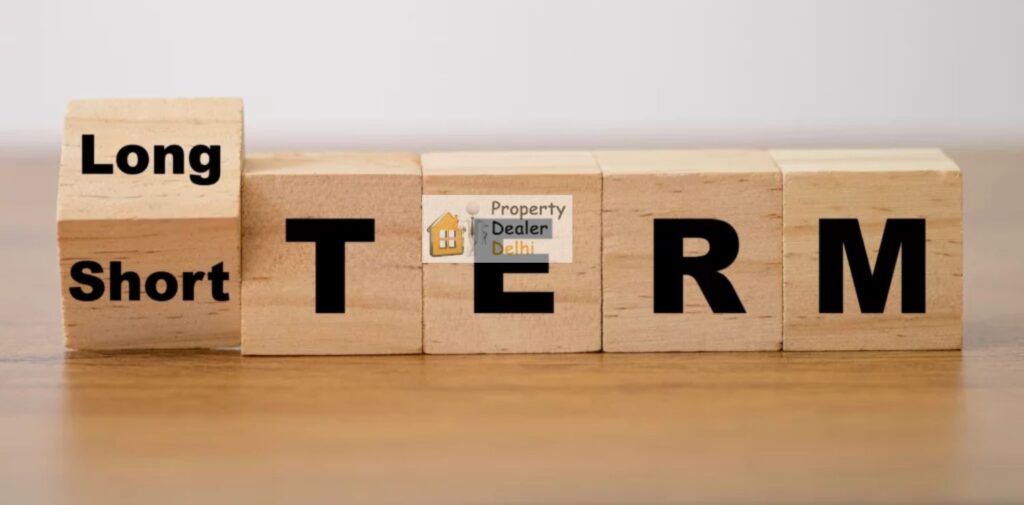
Delhi, as the capital city of India, offers a thriving real estate market that attracts investors from across the country and beyond. Whether you are a first-time investor or an experienced player in the market, deciding between a long-term and short-term Real Estate Investment Strategies in Delhi is crucial for achieving your financial goals. Both strategies come with their own set of advantages and challenges. In this article, we will explore the key differences between long-term and short-term real estate investment strategies in Delhi and help you decide which one is right for you.
Understanding Long-Term Real Estate Investment
Long-term real estate investment generally involves holding a property for a period of several years, usually five or more. The aim is to benefit from the gradual appreciation in property value over time, as well as rental income. This strategy requires patience and a focus on long-term growth. In Delhi, areas like Dwarka, Saket, and Rohini are popular choices for long-term investments, as they are well-established with strong infrastructure and demand.
One of the main advantages of long-term investment is stability. The real estate market in Delhi is known for its slow but steady growth, with prices appreciating consistently over time. Investors in long-term properties can expect regular rental income, especially in areas with good connectivity, schools, hospitals, and shopping centers. Additionally, long-term investments are less likely to be affected by market volatility, making them a safe choice for risk-averse investors.
However, long-term investment does come with some challenges. The property market in Delhi is subject to regulatory changes, such as taxation policies and land use rules, which can sometimes impact the value of properties. Furthermore, the initial capital required for a long-term investment is typically higher, and liquidity is lower, meaning that it may take longer to sell the property if needed.

The Appeal of Short-Term Real Estate Investment
Short-term real estate investment, on the other hand, focuses on holding a property for a short period, usually a few months to a couple of years, before selling it for a profit. This strategy often relies on quick capital appreciation, renovation, or development to make the property more valuable. Short-term investors in Delhi tend to focus on areas undergoing rapid development or gentrification, where they can buy properties at a lower price and sell them at a higher price as the area becomes more desirable.
The main advantage of short-term investment is the potential for quick returns. In a city like Delhi, where infrastructure development and demand for housing are continually increasing, short-term investors can benefit from the rising prices of newly developed or redeveloped properties. Additionally, properties that are renovated or improved can fetch a higher resale price, making this strategy appealing for those who have the resources to renovate or develop the property.
However, short-term investments come with a higher level of risk. The property market can be volatile, and prices may not increase as expected, especially in the case of economic downturns. Moreover, transaction costs like stamp duty, registration fees, and brokerage charges can eat into potential profits, making short-term investments less profitable for some investors. Additionally, short-term investors may face challenges in finding the right buyers quickly, affecting the overall return on investment.

Factors to Consider When Choosing Between Long-Term and Short-Term Investments
When deciding between long-term and short-term real estate investment strategies, several factors must be considered. First, you should assess your risk tolerance. Long-term investments are generally safer and less affected by market fluctuations, while short-term investments come with higher risk but offer the potential for quick profits. If you prefer stability and a steady income stream, long-term investment might be the right choice for you.
Next, consider your financial goals. If you are looking to build wealth over time and are willing to hold onto a property for several years, long-term investment can help you take advantage of property value appreciation. However, if you are looking for quicker returns or have the expertise to renovate properties, short-term investment may suit your goals better.
Location is also an essential factor in deciding which strategy to adopt. For long-term investment, areas with stable growth and good demand are ideal, such as Dwarka, Rohini, or Saket. For short-term investment, look for emerging or developing areas that are expected to experience rapid appreciation, such as parts of Noida, Greater Noida, or Dwarka Expressway.
Lastly, think about your liquidity needs. Long-term investments tie up your capital for extended periods, while short-term investments can offer quicker access to your money. If you anticipate needing funds in the near future, a short-term investment might be more appropriate.
Conclusion: Real Estate Investment Strategies in Delhi
Both long-term and short-term real estate investment strategies offer unique benefits and challenges. Long-term investments in Delhi are ideal for those seeking stability and consistent growth, while short-term investments offer the potential for quick profits but come with higher risks. Ultimately, the choice between these strategies depends on your personal financial goals, risk appetite, and investment horizon.
For most investors, a balanced approach—combining both long-term and short-term strategies—can provide a diversified real estate portfolio, ensuring both growth and profitability. Whichever strategy you choose, it’s essential to conduct thorough research, understand the local market trends, and consult with real estate professionals to make informed investment decisions.

